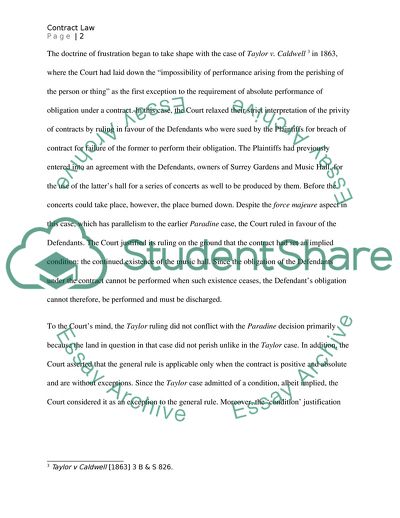Cite this document
(Cases and Materials on Contract Law Assignment Example | Topics and Well Written Essays - 2500 words, n.d.)
Cases and Materials on Contract Law Assignment Example | Topics and Well Written Essays - 2500 words. Retrieved from https://studentshare.org/law/1745700-answer-one-of-the-questions-1when-will-a-party-be-discharged-from-his-contractual-obligations-by-reason-of-a-change-of-circumstances-2-what-are-the-purposes-behind-an-award-of-damages-for-breach-of-contract
Cases and Materials on Contract Law Assignment Example | Topics and Well Written Essays - 2500 words. Retrieved from https://studentshare.org/law/1745700-answer-one-of-the-questions-1when-will-a-party-be-discharged-from-his-contractual-obligations-by-reason-of-a-change-of-circumstances-2-what-are-the-purposes-behind-an-award-of-damages-for-breach-of-contract
(Cases and Materials on Contract Law Assignment Example | Topics and Well Written Essays - 2500 Words)
Cases and Materials on Contract Law Assignment Example | Topics and Well Written Essays - 2500 Words. https://studentshare.org/law/1745700-answer-one-of-the-questions-1when-will-a-party-be-discharged-from-his-contractual-obligations-by-reason-of-a-change-of-circumstances-2-what-are-the-purposes-behind-an-award-of-damages-for-breach-of-contract.
Cases and Materials on Contract Law Assignment Example | Topics and Well Written Essays - 2500 Words. https://studentshare.org/law/1745700-answer-one-of-the-questions-1when-will-a-party-be-discharged-from-his-contractual-obligations-by-reason-of-a-change-of-circumstances-2-what-are-the-purposes-behind-an-award-of-damages-for-breach-of-contract.
“Cases and Materials on Contract Law Assignment Example | Topics and Well Written Essays - 2500 Words”. https://studentshare.org/law/1745700-answer-one-of-the-questions-1when-will-a-party-be-discharged-from-his-contractual-obligations-by-reason-of-a-change-of-circumstances-2-what-are-the-purposes-behind-an-award-of-damages-for-breach-of-contract.


